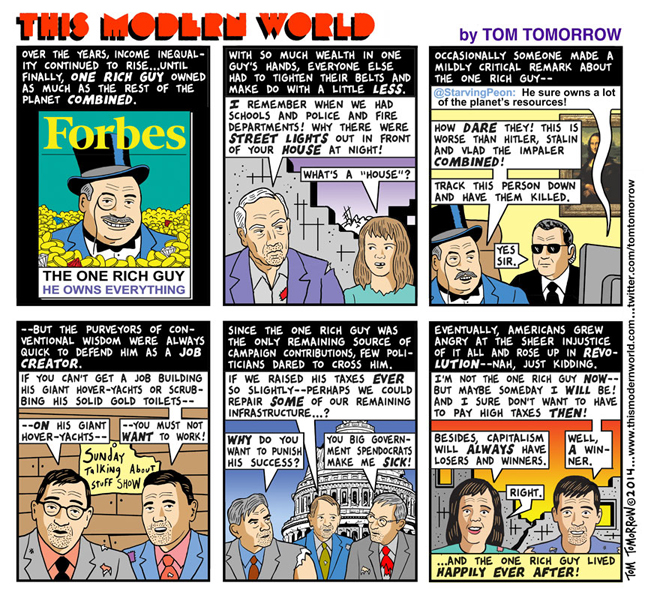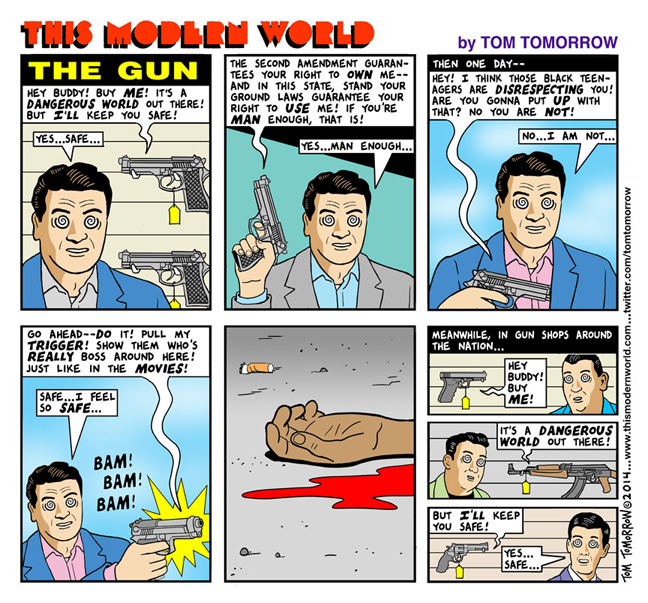A cartoon from 2010:
Charlie Hebdo
My initial cartoon reaction is here.
Some useful links:
— Joe Sacco’s response to the massacre and Ruben Bolling’s response to the response. I respect both these artists immensely, but am definitely more in agreement with Ruben on this:
Charlie Hebdo and the Muslim community’s reaction to it is a complicated issue. But the murders are not.
Twelve people were murdered because of the publication of ideas.
We can try to figure out what those ideas are, but it is irrelevant to our reaction to the murders.
We can look at the value of those ideas, but it is irrelevant to our reaction to the murders.
— Before last week, I’d never heard of Charlie Hebdo, so I’m getting up to speed just like anyone else. Some useful context from French writers here and here. Adding: another good analysis here.
— John Scalzi has some thoughts on freedom of speech:
2. I also recognize that I know almost nothing about Charlie Hebdo, the newspaper, or the tradition of satire and comment that it exemplifies in French culture. From where I sit, a lot of what I’ve seen of it looks kind of racist and terrible. And I understand that Charlie Hebdo didn’t just go after Islamic extremists, and that it went after other groups and people just as hard (and just as obnoxiously). But it reminds me that “we go after everyone equally†doesn’t mean that I feel equally comfortable with all of it, or that it has equal effect. When I say #JeSuisCharlie, it doesn’t mean I want to create or post what I think are racist caricatures and justify them as satire, applied on a presumed equal opportunity basis.
3. But then again my comfort level is about me, not about Charlie Hebdo or anyone else. Free speech, taken as a principle rather than a specific constitutional pratice, means everyone has a right to share their ideas, in their own space, no matter how terrible or obnoxious or racist or stupid or inconsequential I or anyone else think they and their ideas are. I also recognize that satire in particular isn’t about being nice, or kind, or fair. Satire is inherently exaggerated, offensive and unfair, in order to bring the underlying injustice it’s calling attention to into sharper relief. Trust me, I know this. (Satire also has a high failure rate, and the failure mode of satire, like the failure mode of clever, is “asshole.â€) A lot of what I’ve seen from Charlie Hebdo isn’t for me and seems questionable, and that’s neither here nor there in terms of whether it should have a right to be published…
8. If there is one silver lining to the horribleness of the Charlie Hebdo massacre, it is that people have been confronted with the fact of something they take for granted — the right to say what they want to say, how they want to say it — is something that others will literally kill to punish. That Charlie Hebdo is a problematic example — that is offensive, and intentionally so, and it does make people uncomfortable and angry — is, well, good isn’t the right word. Instructive. Sometimes we have to be reminded that free speech isn’t just for the speech we like, or the speech that’s easy to be reasonable about.
…Also: this short video of a Charlie Hebdo editorial meeting is really worth watching. And, an interview with the editor of Liberation.
Philadelphia story
Most of the time, a paper drops the cartoon without ever acknowledging having done so, and it takes readers a few weeks to realize you’re not running there any more. So I owe a thank you to Philadelphia Daily News writer Will Bunch, whose work I’ve been reading for years, for giving TMW a proper sendoff as it loses its longtime Philly print home in the City Paper.
Adding: I storified some thoughts on the editorial zero sum mentality.
New Year’s dance party
Hidden below the fold, as promised in post above.
Another year in cartoons
A few of my favorites from the past year.
The one rich guy:
The gun:



